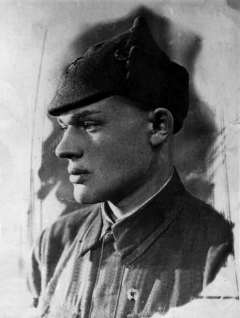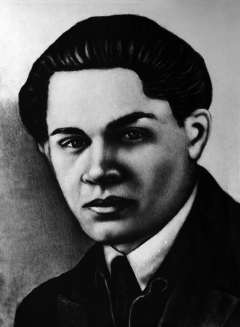Semion Lelchuk was born in 1918 in a traditional Jewish family in the small town of Kalinkovichi, in the Belorussian part of Polesia. After completing seven classes of school in 1935, Semion entered a rabfak (abbr. for "workers' faculty") that prepared workers to enter institutions of higher education. After graduating, he enrolled in the Yiddish division of the Minsk Pedagogical Institute.
At an early age, Semion began to write poems in Yiddish. His works were first published in the journal Shtern in 1938 and later in the newspaper Oktiabr. He then became a member of the Union of Writers of Belorussia. 1940 saw the publication of a joint collection of poems by him and Pinkhas Plotkin. After graduating from a teachers' seminary in 1939, Lelchuk was drafted into the Red Army and sent to the Cheliabinsk Machine-Gunners School, from which he graduated in 1941.
At the beginning of the Soviet-German war in June 1941, Semion was sent to the Baltic Military District and appointed commander of a platoon of a rifle regiment. While in Riga, Semion sent his last letter to his parents, after which there was no further news from or about him until July 1941, when they received a military notification about his death.
An excerpt from Semion Lelchuk's last poem
"Believe it: the war will end with victory
And the fields will be green.
Then any flower will tell
How a hero fought and perished there."
Translated from Russian, website Mishpoha
Poem written by Semion Lelchuk's friend Pinia Plotkin "In Memory of Shimen Lelchuk"
"'I am seeking
For my song
The appropriate word,
That word
I will find'" –
This is what my comrade and [fellow] poet Shimen Lelchuk would have told me.
'In the world, there are unforgettable places,
I will
Sing of Polesia' –
This is what my comrade and [fellow] poet Shimen Lelchuk would have told me.
'Without fear
Looking into the eyes of death
The evil enemy
I repelled –
This is what my comrade and [fellow] poet Shimen Lelchuk would have told me -
had he stayed alive."
Translated from Russian, website Mishpoha





with Pinkhus Plotkin_0.jpg)



